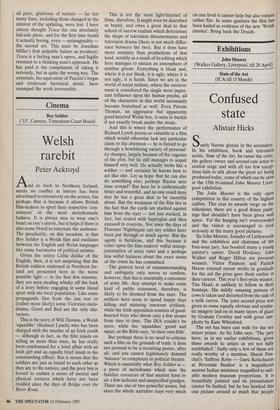Cinema
Boy Soldier (`15', Cannon, Tottenham Court Road)
Welsh rarebit
Peter Ackroyd
And so back to Northern Ireland; surely no conflict in history has been advertised so extensively on the screen, but perhaps that is because it allows British film-makers to sport their respective `con- sciences' in the most melodramatic fashion. It is always nice to wear one's heart on one's sleeve, but it helps if there is also some blood to entertain the audience. The peculiarity, on this occasion, is that Boy Soldier is a Welsh film and oscillates between the English and Welsh languages like some barometer of political animus.
Given the native Celtic dislike of the English, then, it is not surprising that the British soldiers stationed in Northern Ire- land are presented here in the worst possible light — in the first few minutes, they are seen stealing whisky off the back of a lorry before engaging in some blood sport with the local population. Like some propaganda film from the last war or (rather more likely) some Victorian melo- drama, Good and Bad are the only cha- racters.
This is the story of Will Thomas, a Welsh `squaddie' (Richard Lynch) who has been charged with the murder of an Irish youth — although in fact, as the film insists on telling us more than once, he has really been condemned for a brief affair with an Irish girl and an equally brief insult to his commanding officer. But it seems that the soldiers are just as brutal to each other as they are to the natives, and the poor boy is forced to endure a series of mental and physical tortures which have not been rivalled since the days of Bridge over the River Kwai. This is not the most light-hearted of films, therefore. It might even be described as brutal, and owes a great deal to that school of narrow realism which determines the shape of television documentaries and television drama (there is not much differ- ence between the two). But it does have more intensity than productions of that kind, notably as a result of its editing which here manages to sustain an atmosphere of sombre gloom. Everything is bleak and, where it is not bleak, it is ugly; where it is not ugly, it is harsh. Since we are in the world of social realism, where the environ- ment is considered the single most impor- tant influence upon the human psyche, all of the characters in this world necessarily become brutalised as well. Even Private Thomas, an aggressive but apparently good-hearted Welsh boy, is seen to buckle if not exactly break under the strain.
And this is where the performance of Richard Lynch proves so valuable to a film which would otherwise lack any particular claim to the attention — he is forced to go through a bewildering variety of personal- ity changes, largely because of the vagaries of the plot, but he still manages to acquit himself very well. He actually looks like a soldier — and certainly he knows how to act like one. Let us hope that he can also do something else; perhaps Racine next time around? But here he is authentically bitter and resentful, and no one could deny that he has a great deal to be resentful about. But the weakness of the film lies in the fact that the cards are stacked against him from the start — not just stacked, in fact, but coated with Superglue and then encased in concrete. Not since the days of Florence Nightingale can any soldier have been put through so much agony. But the agony is factitious, and this because it relies upon the film-makers' wilful misrep- resentation of army rules and a perhaps less wilful haziness about the exact status of the crime he has committed.
The general level of misunderstanding and ambiguity only serves to confirm, however, that this is essentially a caricature of army life. Any attempt to make some kind of public statement, therefore, is likely to be doomed from the start. The soldiers here seem to spend happy days killing and maiming innocent civilians, while the Irish opposition consists of good- hearted boys who throw only a few stones from time to time. The IRA couldn't be nicer, while the `squaddies' growl and squat, as the Bible says, In their own filth'.
But perhaps there is no need to criticise such a film on the grounds of truth: it does not pretend to be a recruiting poster, after all, and you cannot legitimately demand `balance' or complexity in political theatre. Which is essentially what Boy Soldier is a piece of melodrama which uses the familiar resources of that ancient form to air a few inchoate and unspecified grudges. There are one or two powerful scenes, but since the whole narrative stays very much on one level it cannot help but also remain rather flat. In some quarters the film has been hailed as evidence of the new 'Welsh cinema'. Bring back the Druids.


























































 Previous page
Previous page